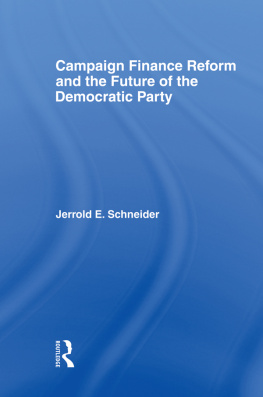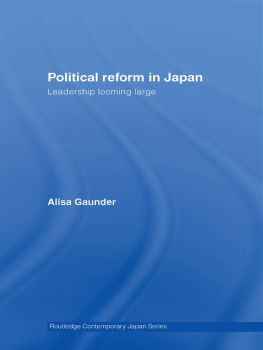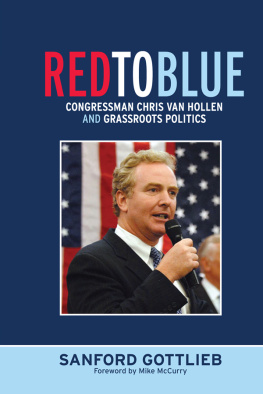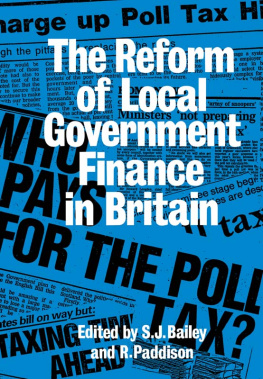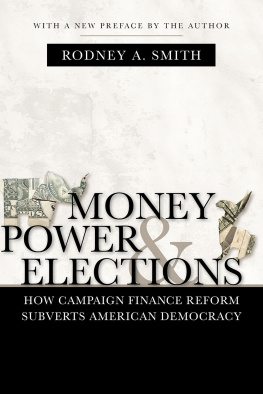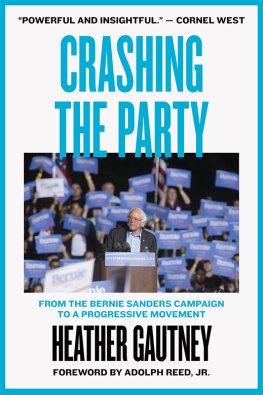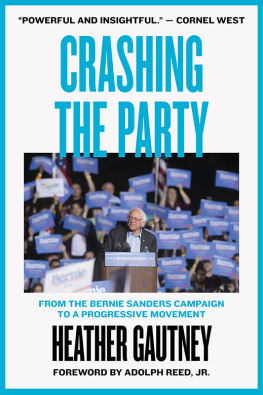Campaign Finance Reform and the Future of the Democratic Party
Published in 2002 by
Routledge
711 Third Avenue,
New York, NY 10017
Published in Great Britain by
Routledge
2 Park Square, Milton Park,
Abingdon, Oxon, OX14 4RN
Copyright 2002 by Routledge
Routledge is an imprint of the Taylor & Francis Group.
All rights reserved. No part of this book may be reprinted or reproduced or utilized in any form or by any electronic, mechanical, or other means, now known or hereafter invented, including photocopying and recording, or in any information storage or retrieval system without permission in writing from the publisher.
Library of Congress Cataloging-in-Publication Data
Schneider, Jerrold E.
Campaign finance reform and the future of the Democratic Party / by Jerrold E.
Schneider,
p. cm.
Includes bibliographical references and index.
ISBN 0-415-93320-X ISBN 0-415-93321-8
1. Campaign funds United States. 2. Campaign funds Law and legislation
United States. 3. Democratic Party (U.S.) I. Title.
JK1991. S36 2002
324.2736dc212001058883
Publishers Note
The publisher has gone to great lengths to ensure the quality of this reprint but points out that some imperfections in the original may be apparent.
To Katharine with love and gratitude
Contents
Chapter 1
I NTRODUCTION
Chapter 2
W OULD C AMPAIGN R EFORM W ORK ?
Chapter 3
T HE D ECLINE OF THE D EMOCRATIC P ARTY
Chapter 4
W OULD C AMPAIGN R EFORM Y IELD E NOUGH M ONEY TO R EFLOAT THE D EMOCRATS ?
Chapter 5
A RE W EAK P ARTIES I NEVITABLE ?
Chapter 6
N INE P ARTY -U NIFYING F ORCES
Chapter 7
A RE THE D EMOCRATS B IG S PENDERS OR B IG I NVESTORS ? I NEQUALITY AND P RODUCTIVITY
Chapter 8
P UBLIC S ECTOR I NVESTMENT
Chapter 9
C ONCLUSIONS
Epilogue
I S C AMPAIGN R EFORM P OLITICALLY F EASIBLE ?
Appendix
T WO P ROMINENT C AMPAIGN R EFORM P LANS
Guide
I AM GRATEFUL TO THE SEVENTY D EMOCRATIC MEMBERS OF C ONGRESS WHO granted interviews for this study, along with the many senior congressional staff who gave generously of their time. The insights gleaned from these interviews were crucial in guiding the development of the argument presented here. I also wish to thank then Congressman now Senator Tom Carper (D-Delaware) and his aid Jeff Bullock, a former student, for assistance. Of course none bear responsibility for the conclusions drawn here.
Though a good deal of time has since passed, three years at the Brookings Institution as a Research Fellow and Guest Scholar had a large influence on this study. I am especially indebted to James L. Sundquist, and several Brookings economists whose work influenced , notably Arthur M. Okun and Barry P. Bosworth. The approach to campaign finance reform used in this study flows from Okuns insights.
Among my colleagues in the Political Science Department at University of Delaware, I particularly wish to thank Marian Palley, Henry T. Reynolds, Leslie Goldstein, and James Soles. Among Delaware economists, my two sometime collaborators Kenneth Koford and Jeffrey Miller provided extraordinary stimulation and colleagueship. Laurence Seidman taught me key economic arguments, which affected my own argument.
Last but not least, Paul D. Stolley, M.D., contributed a great deal to this study at many levels, as did Theodore Kleinman Esq. John Schneider and Liese Schneider were a constant source of inspiration, and some solid criticism. Most of all, my wife Katharine shared my values and helped in so many ways that they cannot be enumerated.
Chapter 1
Introduction
Q. Why stake your Presidential bid on a seemingly quixotic call for a campaign finance overhaul ?
A. Bill Bradley: Its the most important reform we could enact, as important as any in the twentieth century, with the exception of the expansion of voting rights in the 1960s. Money fundamentally distorts our democracy today. We live in a system of one person, one vote. But we all know some people have a lot more clout [due to campaign spending].
Q. You really think reform has a shot?
A. Bill Bradley: Once people realize that theyre paying higher taxes because of the way we finance our political campaigns, well find broader support. For every $500,000 soft-dollar contribution, they need to see if someone got a loophole or a regulatory ruling that cost the rest of us.
T HIS STUDY EXAMINES FOUR RELATED ISSUES . F IRST, IS IT POSSIBLE TO CONSTRUCT a campaign finance law effective enough to prevent campaign contributors from buying legislation, enable legislators to more faithfully represent ordinary citizens, end the disproportionate influence of money in politics, and not crumble into loopholes? Second, is it possible to construct specific mechanisms for putting enough pressure on Congress to force it to enact an effective campaign finance law? Third, would an effective campaign finance law incentivize Democratic lawmakers to shift resources from vast federal waste to popular programs, and thereby reverse the decline in the Democrats voter base? Fourth, would reallocating wasted resources to popular programs enable the United States to achieve key national economic goalsfaster growth in productivity and a reversal in the growth of inequality?
The interaction among these four issues reflect recent changes in American politics and in the Democratic Party. Some time ago, the author was exposed to an insiders view of changes in the Democratic Party. The late Wes Barthelmas was a former senior aid to Senator Robert F. Kennedy. In 1973, at the suggestion of Democratic Party leaders, he went to work for a new young senator, Joe Biden of Delaware, to help him learn the Senates folkways. Barthelmas was known as a savvy player, and so when I had lunch with him in 1976,1 was curious about his views of how and why Democrats in Congress were changing. What he said stayed with me for a long time, and I now know it was wrong. The reasoning in this book carried me beyond his views.
He said a new breed of young Democrats who were different from older northern Democrats had come to Congress in the 1970s. Sometimes called Atari Democrats, they were more probusiness, less supportive of unions, and less likely to stand up for major new federal programs. They were also more adept at using television than older politicians. Older northern Democrats in Congress like Hubert Humphrey and Tip ONeill found a philosophical gulf had grown up between themselves and such Atari Democrats as Paul Tsongas, Tim Wirth, and Gary Hart. Barthelmas believed generational differences accounted for the gap between the Atari Democrats and older liberals. These younger Democrats, he said, had not lived through the Depression and World War II as adults. In his view, they had only known prosperity and so, paraphrasing, they lent themselves less to the solidaristic culture born of those older hardships and more to a culture of personal careers.
I came to see this explanation as inadequate. What troubled me about Barthelmass view was it ignored all the younger activists and their constituents who were born into the same generation as the Atari Democrats, but were committed to progressive politics. Young progressives were found in unions, in the environmental movement, in the civil rights movement, in the womens movement, in the civil liberties community, in the antiwar movement, in progressive religious groups, among consumer advocates, in education reform, and among health reformers. In the intellectual community progressive leadership was provided by such mainstream economists as the Nobel Laureates Robert M. Solow, James Tobin, and Joseph Stiglitz as well as Arthur M. Okun and Lester Thurow.

